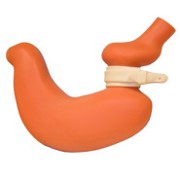 Photo: Getty Images
Photo: Getty Images
Allergan, the manufacturer of a popular device used for gastric banding, the LAP-BAND® System, recently announced that the U.S. Food and Drug Administration has approved expanded use of the device. Formerly, patients with a body mass index (BMI) of 40+, or those with a BMI of 35 with associated medical problems were considered candidates for the procedure. The new approval lowers the BMI threshold to 30 for those with additional medical conditions.
According to Allergan’s press release, 37 million Americans (more than 10 percent of the total U.S. population) have a BMI between 30 and 40. Allergan also referred to research by doctors Jia Haomiao and Erica Lubetkin, published in the American Journal of Preventive Medicine, noting that obesity has become “an equal, if not greater, contributor to the burden of disease than smoking,” in the United States. In other words, obesity now counts for at least as many preventable deaths in this country as smoking.
But what does this mean to you? If you weigh more than you want to, are you a possible candidate for gastric banding? Should you consider it?
The first step is to find out your BMI if you don’t already know it. There’s a particularly good calculator on the National Institutes of Health website: http://www.nhlbisupport.com/bmi/. It will tell you if you are considered obese or simply overweight. If you’re 5’ 5”, for instance, you’re overweight at 150 (BMI of 25) and obese at 180 (BMI of 30).
Let’s say you are 5’5” tall and weigh 180. The second step is to consider your dieting history. Have you truly tried a sustained program of healthy eating and exercise, yet failed to lose weight and keep it off? This is a sign you may be a candidate. Most doctors will insist on this criterion and tell you that gastric banding is not something to choose lightly. The decision will definitely have an impact on your life.
Next, if you have a BMI between 30 and 40, a medical problem associated with obesity--referred to as a “comorbid condition"--will need to be present for you to be a candidate. This could be type 2 diabetes, high blood pressure, sleep apnea or a few others. Of course, if your BMI is 40 or more (around 240 pounds for a 5’5” person), you’ll probably qualify for gastric banding even without any comorbidities.
Take some time to think about whether you’re really ready for the procedure. You may think that once the size of your stomach is restricted, you will automatically lose weight. The reality is, you have to be 100 percent committed to success. It’s possible to cheat if you try, particularly if you’re a fan of “soft calories” like ice cream. Even manufacturers of gastric banding devices will tell you that not everyone succeeds.
And remember that if you’re wildly successful, it’s inevitable you will have loose skin to contend with to one degree or another. You may need to be prepared to consider plastic surgery to feel that your transformation is complete.
Finally, be sure you research all the different weight loss surgery choices—gastric banding is just one. It has advantages, such as being less invasive than other bariatric surgery procedures, adjustable and reversible. But it's not without risks. And, weight loss may not be as rapid or effective with a gastric band as it is for Roux-en-Y bypass surgery, for instance.
Make sure to consult a weight loss surgeon who offers more than one choice. Or, if you visit a gastric banding practice, get a second opinion from a surgeon who also does gastric bypass procedures. Gain an understanding of which type of procedure seems to fit your personal profile best, and make the decision that seems right for you.
References:
http://www.allergan.com
http://www.census.gov/main/www/popclock
http://www.ajpm-online.net/article/S0749-3797(09)00763-6/abstract
http://www.realize.com/dtcf/components/bariatric-surgery-eligibility





Add a CommentComments
There are no comments yet. Be the first one and get the conversation started!